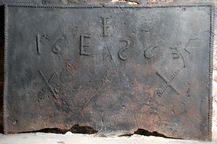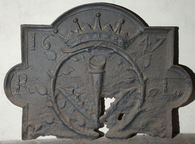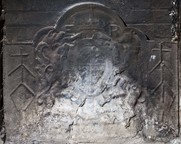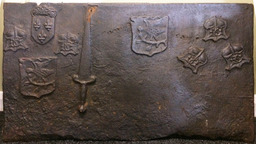-
1319
Description: Rectangular with pediment raised on inverted consoles; fillet edging, ovolo-moulded in the pediment; shield, garter, helm, mantling, crest of a lion surmounting a chapeau, and motto cartouche with obliterated text; on each side, an extension panel with a vertical guilloche pattern.
Notes: One of several firebacks, all varying in size, framing style and moulding, with stylistic features in common and almost certainly the work of the same pattern maker, who was also responsible for carving royal coats of arms in several West Country churches. The presence of the chapeau, or Cap of Maintenance, is unusual on arms of this period, it being more common on medieval achievements.
Copies of this fireback are known.
Arms: English Stuart royal
- Decoration tags:
- rectangular with detached pediment (shape)
- fillet (edging)
- whole carved pattern
- extension panels
- heraldic
- armorial
- royal
Manufactured: in the early-17th century in England.
Current location: Barnstaple Guildhall, Butchers Row, Barnstaple, Devon, England.
- Attached to series:
- Bristol armorial group
- Stuart royal armorial firebacks
-
1262
Description: Arched rectangular shape; ‘egg and dart’ ovolo moulding visible on top and sides; shield, helmet, crest, mantling and supporters of the Mohun family; above the crest, the initials 'EM'; date separated by the crest.
Notes: Cast from a finely carved pattern, the supporters denote these are the arms of a peer. The crest is: Gules, a maunch ermine, with a hand proper holding a fleur de lys or. An incomplete casting (without the initials or date) from Sidney Farm, Alfold, Surrey, is in Guildford Museum. Reginald Mohun (pron. Moon) of Dedisham, Slinfold, Sussex, married Elizabeth Blounte of Dedisham at Slinfold 21 Dec 1618. The Mohun barony of Okehampton, Devon was created in 1628. The fireback design probably dates from after that, the initials and date being added when this copy was cast in 1676. Bellmans auction, Wisborough Green, 1 Oct 2020 lot 3084 (£45).
Copies of this fireback are known.
Inscription: EM / 16 76 / [indecipherable motto]
Arms: Mohun family, barons of Okehampton
- Decoration tags:
- rectangular with round arch (shape)
- ovolo, egg and dart (edging)
- carved stamps
- whole carved pattern
- heraldic
- armorial
- text
Manufactured: in 1676 in England.
Current location: in private hands, Bromyard, Herefordshire, England.
- Attached to series:
- Personal armorial firebacks
- Mohun series
-
1298
Description: Arched rectangular shape; astragal edging (top and sides); top centre, initials RT, widely split date below.
Notes: Simple fireback with a pair of initials and date. The '3' of the date is from a different set of numerals from the others.
Inscription: RT / 17 63
- Decoration tags:
- rectangular with round arch (shape)
- astragal (edging)
- carved stamps
- individual letters
- individual numbers
- text
Manufactured: in 1763 possibly in the Weald area of England.
Current location: Farley Farmhouse, Muddles Green, Chiddingly, East Sussex, England.
- Attached to series:
- Date & initials firebacks
-
1100
Description: Quasi-rectangular shape with inward curving sides; twisted rope edging (top and sides); arrangement of fleurs-de-lys: top centre, four in a star formation with two horizontally below; two vertically to left and right; vertical dagger, pommel to base, stamped twice inside outer fleurs.
Notes: A uniquely shaped fireback with fleurs and daggers (each about 35cm long) seen on two other firebacks (no. 595 and no. 660).
- Decoration tags:
- rectangular (shape)
- rope (edging)
- simple stamps
- carved stamps
- heraldic
- objects
Manufactured: in the mid-16th century in the Weald area of England.
Current location: Sackville College, Church Lane, East Grinstead, West Sussex, England.
- Attached to series:
- Royal series
- Knife & Dagger stamp firebacks
- Fleur-de-lys firebacks
-
505
Description: Rectangular; twisted rope edging (top and sides); inscription (‘S’ reversed) across upper middle of plate, with superscripted central ‘I’ (crossed) ; below each part of the date is a twisted rope saltire (145mm lengths).
Notes: A personal fireback, made to order; a similar commission by Giles Moore, Rector of Horsted Keynes, Sussex, in 1657, cost 13 shillings.
Inscription: I / 16 E S 63
- Decoration tags:
- rectangular (shape)
- rope (edging)
- simple stamps
- individual letters
- individual numbers
- apotropaic
- text
- objects
Manufactured: in 1663 in the Weald area of England.
Current location: in private hands, Ockley, Surrey, England.
- Attached to series:
- Date & initials firebacks
- Rope design firebacks
-
511
Description: Rectangular with semi-circular protrusions on the top and sides; cavetto edging; a pheon (a downward-pointing arrow head barbed on the inner edge), within a wreath, an earl’s coronet above; the date on either side of the coronet; the initials on left and right sides; a fleur de lys in each bottom corner.
Notes: The wreathed pheon and coronet are cast from a different pattern to the 1626 and 1630 plates.
Copies of this fireback are known.
Inscription: 16 47 / R L
- Decoration tags:
- rectangular with round arch (shape)
- cavetto (edging)
- whole carved pattern
- planklines
- heraldic
- text
Manufactured: in 1647 possibly at Robertsbridge Furnace, Salehurst in the Weald area of England.
Current location: Penshurst Place, Penshurst, Kent, England.
- Attached to series:
- Earl of Leicester series
- Personal firebacks
-
1248
Description: Central arched rectangular shape with rounded corners; ovolo moulding all round; oval Tudor royal shield with garter surrounding, topped with a royal crown; dragon and greyhound supporters; initials split by crown; all details below shield illegible; rectangular extension panels on each side, with twisted rope edging; quasi mirrored arrangement of twisted rope lengths to form (from the top) a cross, a vertical pointing arrow, and a diamond shape with a central vertical line.
Notes: The detail of the extension panel is sharper than the armorial, indicating that the panel was cast with a worn copy of the armorial. Illustrated in Weaver, 1914, p. 16.
Inscription: E R [+ Garter, Harvo and royal mottoes, all illegible]
Arms: Tudor royal (prob. Henry VIII)
- Decoration tags:
- rectangular with round arch (shape)
- rope and ovolo moulding (edging)
- simple stamps
- whole carved pattern
- extension panels
- heraldic
- apotropaic
- armorial
- royal
- text
- objects
Manufactured: in the late-16th to early-17th century in the Weald area of England.
Current location: in private hands, Plaistow, West Sussex, England.
Citation: Weaver, L., 1914, Small Country Houses: their repair and enlargement (London, Country Life).
- Attached to series:
- Pounsley series
- John Harvo series
- Tudor royal armorial firebacks
-
348
Description: Composite; Arched rectangular shaped, armorial fireback, cavetto edging, with Stuart Royal arms, garter, supporters, crown and motto, and 1662 date above crown; this overlies a rectangular plate, with rope-effect, fillet edging; a pattern of four rosettes surrounding a fleur-de-lys, its stem terminating in a small buckle, is repeated on each side of the central armorial fireback, with the initials above; each rosette is stamped separately.
Notes: A variant, bearing the same date, but the initials, A B, and without the rosettes, is at Norton Manor, Malmesbury, Wiltshire. Copies were advertised in F. Parkin & Sons (Exeter) catalogue in 1967 and 1972.
Copies of this fireback are known.
Inscription: 16 62 / C P / HONI SOIT QVI MAL Y PENSE / DIEV·ET·MON DROIT
Arms: English Stuart royal
- Decoration tags:
- rectangular with round arch (shape)
- fillet (edging)
- carved stamps
- whole carved pattern
- composite
- individual letters
- armorial
- royal
- text
Manufactured: in 1662 possibly in the Forest of Dean area of England.
Current location: Tiverton Castle, Tiverton, Devon, England.
(part of the Colchester & Ipswich Museums Service museum group)
-
1109
Description: Rectangular; plain edging; asymmetrical arrangement of stamps: top right, three 'renaissance' style shield stamps with a 'PL' monogram above two [?]bougets, in a triangular arrangement bases uppermost; top centre, a shield, indented at the top, charged with a bird upon a branch; top left, crowned shield of France Modern between two inverted 'PL' monogram shields above a bird shield; to the right, a broad bladed dagger, point uppermost.
Notes: The dagger is of the cinquedea style, introduced from Italy in the early-16th century, length approx. 38cm; the bird shield stamp has been seen on other firebacks. Wilkinson's Auctioneers, Doncaster, 24 Feb 2019, lot 534 (£650).
Inscription: PL [in five shields]
Arms: 'France Modern'
- Decoration tags:
- rectangular (shape)
- none (edging)
- simple stamps
- carved stamps
- heraldic
- monogram
- armorial
- royal
- objects
Manufactured: in the early- to mid-16th century in the Weald area of England.
Current location: not known.
- Attached to series:
- Bird shield series
- Knife & Dagger stamp firebacks
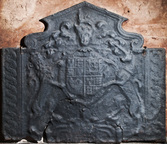
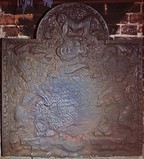
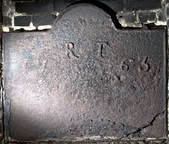
.jpg)
